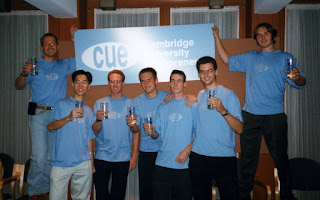 |
| Image: Chris Williamson / CUE Finale 2016 |
Back in 1999, a group of us organised a panel discussion on
finance for start-ups, targeted at students and researchers in the University
of Cambridge. We invited excellent speakers from the business community,
promoted the event widely, ordered plenty of drinks, and arrived at the venue
looking forward to an informative, interactive and lively discussion. To our dismay, we had more people on the
panel than there were in the audience.
Scroll forward 17 years and the situation is somewhat
different. There are now over 30 initiatives supporting entrepreneurship across
the University, each of which contributes to making Cambridge one of the most
entrepreneurial universities in the world. The outputs of this activity range
from the formation of billion dollar corporations to social ventures that aim
to transform the lives of millions.
So how did we get from entrepreneurship being an almost
invisible, sometimes frowned-upon activity within the University to something that
is widely encouraged, celebrated and supported?
It’s hard to tell that story without also describing the wider ‘Cambridge
Phenomenon’, but that is something that has been much better done elsewhere (not
least through the books and reports of the same name – see www.cambridgephenomenon.com). Just focusing on activities within the
University, the story can be told through three broad phases:
Experimentation
 |
| 2000 launch of CU Entrepreneurs (Image: Tim Minshall) |
Consolidation
 |
| Cambridge Enterprise website c.2004 |
Institutionalisation
 Today, entrepreneurship is an integral part of the
education, research and engagement activities of the University. Cambridge Enterprise is one of the UK’s most
successful university-based IP commercialisation organisations, with a
substantial and successful range of investment funds to support its activities.
The development of entrepreneurship skills now sits with a range of
organisations, key among these being the Cambridge Judge Business School EntrepreneurshipCentre. The stimulation of interest in entrepreneurship is fuelled by numerous
business plan competitions. Not only are there the large-scale and long-standing
activities CU Entrepreneurs, but there are also now several college-based
competitions and a recently launched competition targeted at post-doctoral
researchers. The early-stage development of new ventures is supported by
organisations including ideaSpace and Accelerate Cambridge.
Today, entrepreneurship is an integral part of the
education, research and engagement activities of the University. Cambridge Enterprise is one of the UK’s most
successful university-based IP commercialisation organisations, with a
substantial and successful range of investment funds to support its activities.
The development of entrepreneurship skills now sits with a range of
organisations, key among these being the Cambridge Judge Business School EntrepreneurshipCentre. The stimulation of interest in entrepreneurship is fuelled by numerous
business plan competitions. Not only are there the large-scale and long-standing
activities CU Entrepreneurs, but there are also now several college-based
competitions and a recently launched competition targeted at post-doctoral
researchers. The early-stage development of new ventures is supported by
organisations including ideaSpace and Accelerate Cambridge.
Reflecting on what has enabled the development of these entrepreneurship
support activities within the University, some key characteristic can be
observed:
- ‘Let a hundred flowers blossom’: Perhaps as a result of the federal nature of the University, there have been no (successful) attempts to centrally control the development and delivery of entrepreneurship support activities. While this has for sure resulted in some redundancy and overlapping of activities, the positive impact of having a demand driven, entrepreneurial attitude to entrepreneurship support has been huge.
- Things could always be better: At no point in the development of all the initiatives described above has there been any sense of complacency. Though frustrating at times, there is a constant and pressing demand to innovate and improve in response to the ever-changing context.
- Blurring of ‘Town and Gown’: A very commonly used and heard phrase in Cambridge is: “Hmm, not sure, but I’ll put you in touch with someone who can probably help”. This is exemplified in the substantial two-way flow of expertise, resources and people between the entrepreneurship programmes within the University and local business community.
- Altrusim: No names of individuals have been mentioned in this article (partly because it is too easy to cause unintentional offence by not mentioning someone who played a pivotal role), but more importantly because those who have been involved in developing entrepreneurship activities in Cambridge seem to typify what Harry S. Truman said: ‘It is amazing what you can accomplish if you do not care who gets the credit’. This attitude, coupled with a common sense of purpose to ‘make things better’, seems to be what continues to drive the growth of entrepreneurship at Cambridge.
If you have a moment, take a look at the website of the University Enterprise Network. This
will give you a flavour of the range and diversity of activities now available
to help students, researchers and staff Cambridge ensure that the ideas being
generated at the University are used to improve lives across the world.
